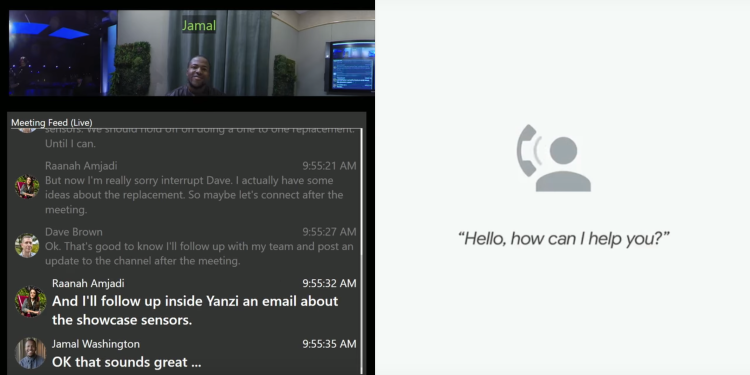testsetset
With one jam-packed week for both Microsoft’s Build and Google’s I/O developer conferences, there’s plenty of news to talk about, and not just about AI. What stuck out to me most, however, was the tepid reaction to Microsoft’s modern meetings demo and the ongoing discourse about Google’s Duplex demo.
This is a perfect example of the two companies’ differing approaches to developing, marketing, and pushing their respective technologies. Microsoft focuses on the enterprise, and then tries to figure out ways to bring its products back to consumers. Google is focused on internet users, and then tries to figure out ways to sell its offerings to businesses. Both have seen big successes and failures for these strategies. When it comes to AI, Microsoft comes off as super careful while Google looks tone deaf.
For those who haven’t seen it yet, here’s Microsoft’s modern meetings demo, which showed real-time AI services helping solve a variety of problems:
June 5th: The AI Audit in NYC
Join us next week in NYC to engage with top executive leaders, delving into strategies for auditing AI models to ensure fairness, optimal performance, and ethical compliance across diverse organizations. Secure your attendance for this exclusive invite-only event.
Microsoft employees were clearly given a very specific script to follow (Update: Microsoft confirmed none were hired actors). That said, the demo was live. All the real-time transcription was happening on stage (if you look closely, you’ll notice minor mistakes in the logs) and all the software appeared to be reacting (more or less) as expected.
This was a polished demo, sure, but not too polished and frankly awkward at times, just like what you would expect from a corporation. That gave it a genuine feel, although it also meant it was nowhere near as exciting.
Here is Google’s demo, which I’m sure you’ve seen by now, of Assistant making phone calls on its user’s behalf:
Google showed off two different use cases, and emphasized they were real phone calls made to real people. The humans on the other end were not only unaware beforehand that they would be contacted, they were not made aware they were talking to Google Assistant, which, after the online backlash, Google has said it would disclose.
Google’s demo was polished too, but in a different way. The calls were recordings — they were not made live onstage. The impact was bigger, because the technology was more advanced (and more controversial), but it was also obviously cherry-picked. Google likely performed hundreds, if not thousands, of these calls, and selected two of the best ones.
Microsoft’s demo isn’t getting reposted over and over on social media, it’s not being covered relentlessly days later, and it’s certainly not being talked about as the single thing that stood out at Build. Google’s Duplex, meanwhile, is the main highlight out of I/O that keeps coming up, over and over, for better or for worse.
That is despite the fact Google made clear this was an experiment; if Duplex ever sees the light of day, it won’t work in the same way as we saw this week. Meanwhile, Microsoft’s technologies look like they could roll out at some point this year.
That said, it’s worth remembering that most of what gets shown off at these major tech events, unless it is ready and available right then and there, doesn’t end up shipping, for one reason or another. There’s a reason they are being shown and not launching — developer events are used to debut new products and tools, but also to gauge interest and test new ideas.
Microsoft’s approach was cautious — exactly what businesses want. Google’s was much more exciting — exactly what consumers want. Both come with their own set of consequences.
Which strategy do you prefer: Better to be safe than sorry, or all press is good press?
ProBeat is a column in which Emil rants about whatever crosses him that week.


